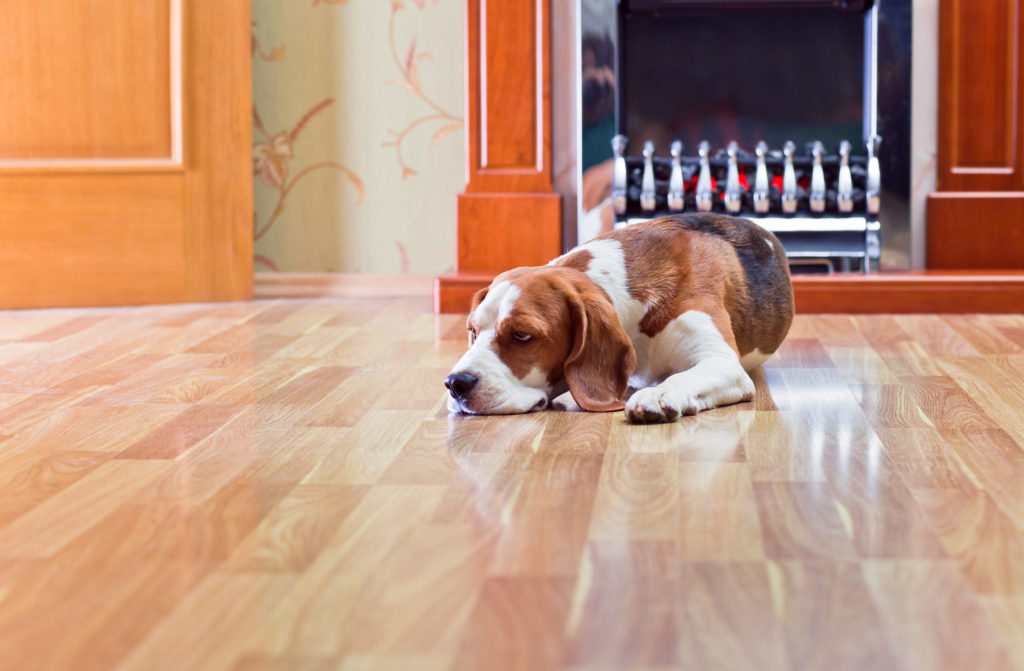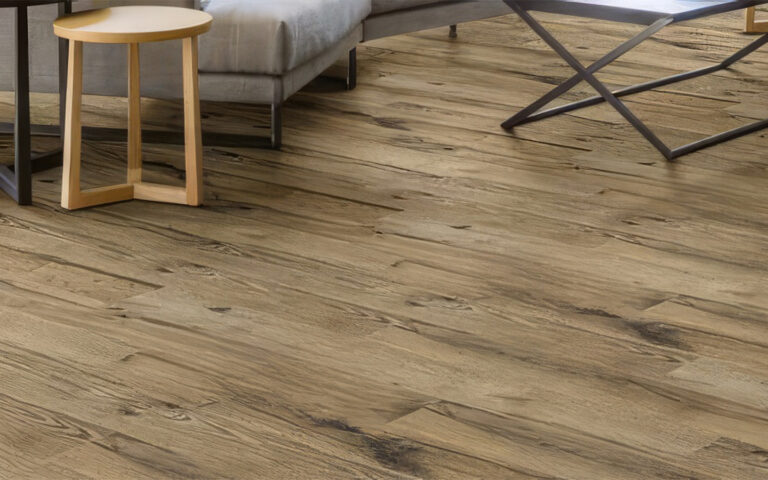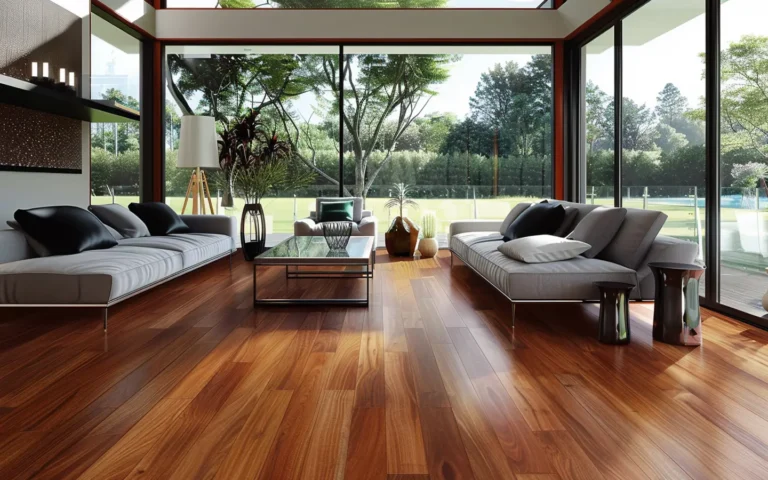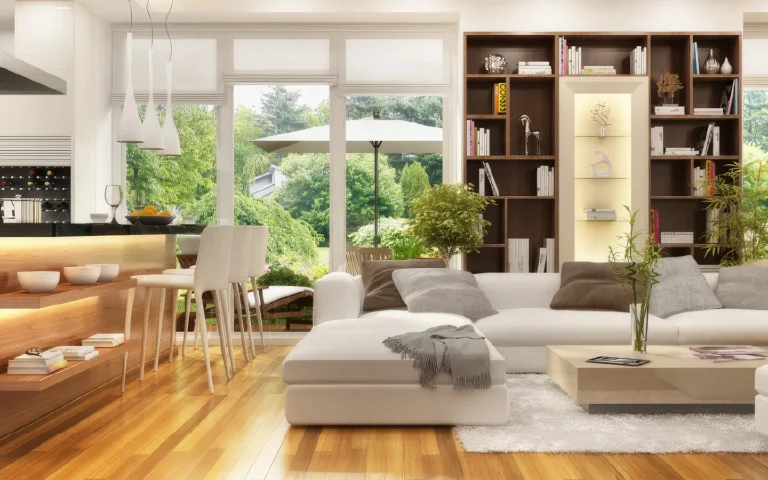This post may contain references or links to products from one or more partners of our parent company and/or subsidiaries of our parent company. For more information, visit this page.
April 7, 2020
Are you in love with the look of hardwood floors? So are we! But we also know that buying hardwood floors comes with a number of special considerations. Whether it’s your first time floor shopping or whether you’re a seasoned home-improver, we want to make sure you have all of the facts before making a big decision. That’s why we’ve crafted this hardwood floor buying guide to make sure that wood floors are the perfect fit for you.
Hardwood is one of the most highly sought-after types of flooring available, but that doesn’t mean it works for everyone. Just because wood is popular doesn’t mean you have to “go with the grain.” Some may prefer the easy installation of Home Depot peel-and-stick carpet tiles or the versatility of vinyl plank flooring. And we say: more power to you! Find your bliss.
But if you’re seriously thinking about adding hardwood to your home (and you should), we’ve created this hardwood floor buying guide to help you choose the right type of wood flooring to fit your needs. We’ll talk about lifestyle considerations, the many different styles of wood flooring, the actual cost of buying hardwood floors, and the technical aspects of using wood in your home!
Does Buying a Hardwood Floor Fit Your Lifestyle?
The first and most important question you’ll want to ask yourself is “does hardwood flooring work for me?” If you’re reading from home right now, take a look around. If you’re not, close your eyes and transport yourself there.
Do you see yourself sliding across rich slabs of oak or maple in your socks? Or perhaps a different floor gives you Tom Cruise levels of enthusiasm? Consider the following when you’re deciding between hardwood vs. carpet, or any other type of flooring.
Is Hardwood Good for Kids and Pets?

If you share your home with little ones, furry or otherwise, you may be wondering: is hardwood kid-friendly? Is it pet-friendly? Truthfully, it’s all relative.
When comparing tile vs. wood floors, for example, you’ll find that wood is usually softer and more slip-resistant—which could help your kids and pets avoid painful mishaps. On the other hand, if you were deciding between laminate vs. hardwood floors, laminate may be the better choice for pets and kids because of its durability and spill-resistance.
Hardwood can be a pet-friendly and kid-friendly choice, depending on your needs. For best results, ask a local flooring expert if you have a wood-friendly household.
Maintenance Requirements for Hardwood Floors
If you’re thinking about buying hardwood flooring, take a moment to consider how much work you want to put into maintaining your new floors. To keep your wood floor looking pristine and prolong its life, we recommend sweeping or dust mopping every day. Wet mopping can damage many wood flooring types, so special wood cleaning products may be required.
For some, a daily sweep is an easy chore. For others, you may want to choose a lower-maintenance type of fake wood flooring.
How Does Hardwood Stand Up to Wear and Tear?
We all know that hardwood is one of the most beautiful and well-loved types of flooring. While it’s not always the most durable flooring, it has one distinct advantage over other flooring choices: many types of wood flooring can be refinished! So, while scuffs, scratches, and dents may find their way onto the floor over time, solid hardwood has a built-in reset button.
Best Brands of 2024
Style Considerations When Buying Hardwood Floors
This is the fun part. There are so many colors, textures, wood floor designs, and finishes to choose from! Let’s break it down:
Choosing Your Wood Types
You have two major wood flooring types to choose from:
- Solid hardwood is the same type of wood throughout, whether it’s oak, walnut, cherry or maple.
- Engineered hardwood consists of a sturdy base layer made of rigid plywood or high-density fiberboard and a thin veneer layer of solid wood.
The type of wood you choose should reflect your personal taste, lifestyle considerations, and your budget.
Choosing Your Wood Species and Grain Pattern
Along with the engineered vs. solid wood consideration, you’re also going to want to think about species and cut pattern when buying hardwood floors. This wouldn’t be much of a hardwood floor buying guide without talking about the clean beauty of oak, the shine of teak, and the luster of walnut, would it?
When it comes to wood species and cuts, you have endless options. While you can check out this guide to the best hardwood floors for info on specific wood species, here are some basics:
- Domestic hardwoods like oak will often be less expensive than exotic hardwoods like mahogany.
- Exotic hardwoods often rank higher on the Janka Hardness Scale, meaning they’re often more resistant to dings and dents.
- Your cut pattern will also define much of how your floors look. Do you want flat-sawn floors? Quarter-sawn? Rift-sawn? Each one offers different visual perks!
- It’s more common to be able to choose cut patterns when buying solid hardwood, but some of the best engineered wood flooring products come in different cut patterns as well.
How Will Your Hardwood Floors be Finished?
In addition to selecting the grain patterns and colors of various types of wood, buying hardwood floors means choosing a finish. Some hardwood floors will arrive at your home pre-finished, while others can be finished on site. Some wood floor finish options include:
- Polyurethane (oil-based or water-based)
- Moisture-cure Urethane (originally created for bowling alleys)
- Wax
- Shellac
- Penetrating oil sealer
- Aluminum oxide (available on prefinished planks, and often included in most modern finishes)
There are really endless options available when you’re talking about finishing your floors. Our advice? Find a flooring dealer near you and get their opinion on your specific situation. Most often, you won’t want to have your floors finished in-home if you can avoid it, but you do you.
Can All Hardwood be Refinished?
Refinishing can make your floors look new again. Most solid wood floors are relatively thick, roughly ¾”, and can be refinished multiple times. Some types of engineered hardwood may only be refinished once or twice, while others cannot be refinished at all.
Non-wood natural flooring types are no exception, either. Depending on the thickness of the veneer, this can be either a pro or a con of engineered bamboo flooring. Additionally, when you look at the pros and cons of cork flooring, you’ll notice that not only can cork be sealed and refinished, but it MUST be resealed in order to maintain quality.
The Real Price of Hardwood Floors
It wouldn’t be a hardwood floor buying guide if we didn’t talk about dollars and cents. The true cost of hardwood isn’t just about the charge on your credit card statement. It’s also about adding value to your home, for both sentimental and resale reasons.
Hardwood Floor Cost Per Square Foot
Wood flooring cost can vary widely between wood flooring types. Rare and exotic wood species can start at around $15 per square foot, while more common wood species can range between $3 and $10. While not a true wood species, the best bamboo flooring usually comes in between $3 and $12 per square foot.
If you like the look of exotic woods like teak or mahogany but the cost doesn’t fit your budget, engineered hardwood may be an option to consider. Because engineered wood requires only a thin veneer of solid wood, you may be able to snag a fancy wood type at a lower cost.
Installation Costs of Hardwood Flooring
Installing solid hardwood flooring is a precise and delicate process, and unless you have a good foundational knowledge of how to replace flooring, it’s a good idea to let your local flooring expert handle it. The cost of installing hardwood varies based on your location, the type of wood, and the difficulty of the job. According to HomeAdvisor, the average cost of common hardwood installation is between $3 and $8 per square foot.
Can I Install Hardwood Myself?
Many types of engineered hardwood and even some types of solid hardwood come with a click-together flooring option. This type of do-it-yourself flooring is easier to install than traditional nail- or glue-down wood planks which require a lot of technical know-how. And bonus point: it also makes professional installation quicker and cheaper.
Does Hardwood Add Home Value?
Return on investment is one of the qualities that sets buying hardwood floors above other flooring types. In most areas, solid hardwood offers one of the best returns of any flooring type.
This is especially true in colder regions, like New England, where wood flooring is highly sought-after. In warmer climates, options like tile may have a better resale value as they will help keep the overall temperature of your home cooler in the summer months.
What if you don’t plan to sell your home any time soon? Is hardwood still a great value? We say YES. Unlike other flooring types, hardwood can be refinished and last a lifetime. As long as you choose a wood flooring type that you absolutely love, the comfort and style of hardwood floors can add timeless value.
Hardwood Floor Buying Guide Tip: Always Consider the Scope of Your Project
Project scope refers to the quantity and type of work required to make your flooring dreams come true. This part of our hardwood buying guide may not be the most scintillating, but it’s important to evaluate the technical considerations of buying hardwood floors to avoid costly changes down the road.
Subflooring Impacts Installation
It’s a good idea to know your subflooring type when shopping for hardwood floors. Concrete slab and plywood are two common types of subfloors. Various subflooring types have different qualities when it comes to hardness, sound absorption, and ease of installation.
If you’re thinking about installing floating floors, the type of subfloor will dictate the proper underlayment to use before laying down the visible layer of flooring. Be sure to find out what type of subfloor exists in your home and don’t forget to check out some of the benefits and disadvantages of floating floors.
Height and Weight Restrictions When Buying Hardwood Floors
Thinking about installing hardwood on an upper floor of your home? You’ll want to know the load restrictions to find out if your home can sustain the weight of solid hardwood floors.
Do you live in an apartment building or condo with metal doors? While wooden doors are easy to cut to size in order to accommodate new flooring, metal isn’t so simple. It’s a good idea to make sure that there will be enough room to install a thicker wood flooring type so that the doors don’t scrape and scratch against the floor and cause damage.
The height and weight restrictions in your living space are important considerations before buying your hardwood floor. For a lightweight and natural flooring option, check out our guide to the best cork flooring.
Where Will Your Hardwood Floor Be Placed?
There are so many fantastic waterproof flooring options available these days, but hardwood floors are not one of them. Moisture and humidity can be severely damaging to hardwood floors, so it’s better to keep them away from bathrooms, kitchens, and any other moisture-prone areas.
If you want the look of wood in one of these areas, consider one of the many types of tile that offer a wood-grain look.
Conclusion: Is Buying Hardwood Flooring Right For Me?
Hardwood flooring is an investment that can add warmth, comfort, and value to your home. No one flooring type will suit everyone’s living style and budget, however. If you’ve faithfully read over our hardwood buying guide, weighed the pros and cons of hardwood, and have decided that the benefits outweigh the costs, then we say dive right in!
Where Should I Buy Hardwood Floors?
The best way to learn more about buying hardwood is by talking to your local flooring retailer. Use our flooring stores near me tool to find flooring experts nearby. These professionals will provide the personalized service and expertise you need to find the perfect flooring fit.
Want to learn more about other types of flooring? Check out these other great resources on our blog:
About The Author

Kelly Pitts
April 7, 2020
Kelly is a freelance lifestyle and wellness writer. Her guilty pleasures are coffee and celebrity gossip. When she’s not hard at work creating content, you can find her traveling the world, being a crazy fish mom, and cooking vegan food.






